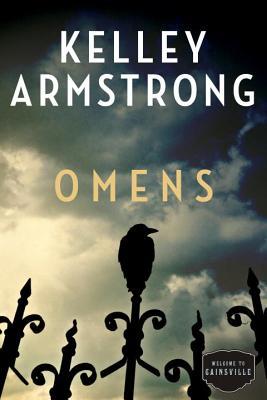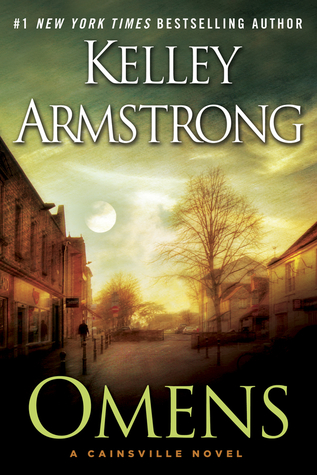Q: OMENS, featuring twenty-four year old Olivia Taylor Jones, fits into a "new" genre that's been getting some recent media attention--New Adult literature, which is "literature for those who are 18+, or quite literally 'new adults'." What do you think of this classification?
A: After the explosion of YA fiction, it became increasingly obvious that there was still a gap to be filled. I wrote my YA for my daughter, and once she passed 18, she discovered that her choices were to stick with teen books (and teen protagonists) or start reading about characters often a decade or more older than her. That leaves a very exciting life phase unexplored in popular fiction--new adulthood, when young women (and men) embark on new lives. It's a time of upheaval and independence and "firsts"--first time living away from home, first job, first apartment, perhaps first serious relationship--all of which offers enormous opportunities for conflict--internal and external.
I've explored that age group many times--I have 5 books in my adult Otherworld series with protagonists under 25. Olivia in OMENS is 24. These aren't books for younger readers--they simply feature younger main characters.
One problem with calling Omens "New Adult," though, is most of the books currently marketed that way are romances. I love romance, and I almost always include a romantic subplot. While a romance thread will enter the series later, OMENS is about Olivia finding her own way--leaving the safe world of youth, striking out alone and discovering who she is...with plenty of mystery and mayhem to liven up the journey!
Q: Olivia grapples with the shocking news that she is the child of convicted serial killers. What inspired you to want to write this, and how did you do your research?
 A: I'm a thriller buff. Always have been. So I've included serial killers in a few of my Otherworld novels, which has meant lots of past research. The research specifically for OMENS was on the legal aspects--sentencing, incarceration, appeals process, etc. As with most research, very little of it found its way directly into a novel, but I needed to know it as background. I'll admit I often go overboard in any kind of research. I love it, and OMENS offered so many opportunities--everything from killers to Houdini to superstition to CIA history--that I was in research heaven!
A: I'm a thriller buff. Always have been. So I've included serial killers in a few of my Otherworld novels, which has meant lots of past research. The research specifically for OMENS was on the legal aspects--sentencing, incarceration, appeals process, etc. As with most research, very little of it found its way directly into a novel, but I needed to know it as background. I'll admit I often go overboard in any kind of research. I love it, and OMENS offered so many opportunities--everything from killers to Houdini to superstition to CIA history--that I was in research heaven!Q. The town of Cainsville, outside Chicago is almost a character in itself, and is the title of the series. Is it based on a real-life town? What influenced your creation of this place?
A. Cainsville is 100% fictional. In the past, I've based small towns on ones I know, but let's just say there isn't anything quite like Cainsville out there. It really is a place completely rooted in my imagination. I've always loved the old horror standard of the "small town with a secret," and I wanted to try building one of my own. I wrote the town history, drew the maps, pored over architecture, created town festivals and local customs...Again, not much of that actually appears in the first novel, but it's like the character development--I need to know it to give the scene that this is a fully realized, fully developed place. And, in many ways, Cainsville is as much a character as any of the people in it.
Q. The theme of identity is central to this novel. Why did you want to explore this issue?
A. Most of my writing explores issues of identity. It's a topic that fascinates me--both in itself and in the many ways it can be encountered and explored. My first novel, Bitten, was about a female werewolf torn between the human world and her wolf nature. Both my YA trilogies center around teen girls discovering they have supernatural powers and grappling with how that changes their already-maturing identities. My Nadia Stafford trilogy is about an ex-cop turned hit woman reconciling who she is with what's she's become. And explaining the books like that make them sound terribly dull...or much deeper and more contemplative than they are! But identity is an underlying theme of every series I write: who we are really, when we strip away expectations, and acknowledge and accept all facets of ourselves--the good, the bad and, sometimes, the ugly.

Q. How is writing this series different than writing your YA books?
A. It doesn't matter whether my protagonist is fifteen, twenty-five or forty-five. The difference is only the age of that character. Her skills, experiences and outlook will be very different because of her age, and the story must reflect that. Otherwise, it's the same. Teen readers aren't kids--I do write middle-grade as well, and that's quite different, but teens are reaching their adult level of reading comprehension, so their books are not "dumbed down" in any way--diction, complexity of plot, complexity of character, etc.
Q. You've launched several successful series--what do you consider when starting a new storyline? Do you envision how the plot will play out several books?
A. Starting a new project is, for me, like being set loose in a candy shop. I run around snatching up the treats, saying "I want this and this and this and, oh, wait, I've never tried this--I'll take that too." Perhaps not the wisest way to approach a candy shop--or a career! I should probably step back and consider what's good for me--i.e. what's most marketable--but I have no more interest in that than I do in picking "healthy" candy. I love to tell stories. Absolutely love it. And a new series means I get a fresh chance to pick out all the elements I love and indulge myself and my imagination.
As for envisioning how the plot will play out, I do outline. However, that does not mean I'm bound to that outline. It's a general road map, so I have a rough idea where I'm heading. As the characters come to life and the story plays out, I'll see better routes--more interesting or more fraught with conflict and tension--and I change my path.
Q. OMENS has a supernatural aspect, but it's very subtle. It's the mystery of Olivia's past that is front and center in the novel. Are there any suspense writers that have influenced your work?
 A. I read more thrillers than any other genre, so my influences are vast! My tastes run darker, particularly to noir, but I'm very omnivorous with my reading habits, and I hesitate to start naming names, because I'll leave some out. Let's just say that if you look at a chart of bestselling thriller authors, I read about 80% of them as well as many more who aren't on that chart.
A. I read more thrillers than any other genre, so my influences are vast! My tastes run darker, particularly to noir, but I'm very omnivorous with my reading habits, and I hesitate to start naming names, because I'll leave some out. Let's just say that if you look at a chart of bestselling thriller authors, I read about 80% of them as well as many more who aren't on that chart.Q. You're known for including many types of supernatural characters, including witches, sorcerers, werewolves, necromancers, ghosts, shamans, demons and vampires, rather than limiting herself to a single type. Tell us--do you have a favorite?
A. My answer never changes. I started with werewolves because they're my favorite, and while there are many characters who are as much fun to work with as my werewolf ones, for "supernatural type" they'll always top my list.
Q. Can you give us any hint about what we can expect in Olivia's upcoming books?
A. I can tell you what to expect for Olivia. Trouble, trouble and more trouble. I always say that the more I like a character, the more crap I put her through. I really like Olivia...poor girl. I'm almost done with the first draft of Cainsville 3, and I can guarantee things aren't going to get any easier for her. But easy is boring , and Olivia isn't cut out for that. Plus, she will get a little romance in reward (although that might not exactly simplify her life...).
Hope you enjoyed that little Q&A provided by the publisher! Stay turned for tomorrow's Q&A with Kelley with questions I thought of!



No comments:
Post a Comment
Comments are an award all on their own! So my blog is an award free one! Thanks for any consideration though!